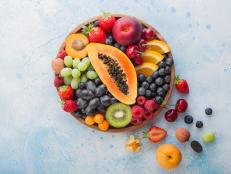Should You Be Concerned About Weed Killer In Hummus?
Our nutritionist says it's still safe to eat hummus, and here's why.

Westend61/Getty Images
You may have seen headlines claiming that hummus isn’t safe to eat. The Environmental Working Group (EWG) claims store-bought hummus contains levels of glyphosate, a commonly used herbicide, that are unsafe. Here’s a look into those claims, and advice on buying hummus at the store.
First Things First: You Should You Still Eat Store-Bought Hummus
It should be noted that the EWG states that the health benefits of hummus and chickpeas outweigh health concerns people may have due to their report. In addition, the glyphosate levels are below those set by the authority of the EPA. As such, you can safely continue to consume commercial hummus as part of a balanced diet.
But Is There Herbicide In Hummus?
The EWG commissions an independent lab to check for glyphosate regularly. According to the International Agency for Research on Cancer (IARC), glyphosate is classified as a “probable human carcinogen.” According to the EWG, more than 80% of non-organic hummus and chickpea samples tested had glyphosate and far lower amounts were found in organic versions. One-third of the 27 conventional hummus samples exceeded the EWG’s set benchmark of 160 parts per billion (ppb) for daily consumption, based on one 60 gram serving of hummus (about 4 tablespoons).
However, EWG's set benchmark is well below that of the Environmental Protection Agency (EPA) which is 5,000 ppb. Twelve brands of organic hummus and six organic chickpea samples were tested and all but two contained detectable concentrations of glyphosate. The EWG concluded that pre-harvest use of glyphosate should be banned and the EPA's standards should be much stricter.
According to Bayer U.S. toxicologist and science communicator, Bill Reeves, PhD, regulatory authorities have strict rules when it comes to pesticide residues. “In the U.S., the EPA sets daily exposure limits at least 100 times below levels shown to have no negative effect in safety studies. Even at the highest level reported in the hummus samples (2,379 ppb), an adult would have to eat 64 pounds of hummus every day for the rest of their life to reach the strict limits set by the EPA.”
Should You Be Concerned About Glyphosate in Food?
In January 2020, as part of the lastest routine registration review of glyphosate the EPA stated, “Due to its widespread use, trace amounts of glyphosate residues may be found in various fresh fruits, vegetables, cereals and other food and beverage commodities. However, these trace amounts are not of concern for the consumer. The EPA conducted a highly conservative dietary risk assessment for glyphosate that evaluated all populations, including infants, children and women of child-bearing age. EPA assumed that 100 percent of all registered crops were treated with glyphosate, that residues were at the tolerance level for each crop, and that residues in drinking water were from direct application of glyphosate to water. These assumptions would lead to much higher estimated levels of exposure than would be expected to occur with actual use. The resulting conservative estimates of dietary exposure were not of concern.”
In addition, the U.S. Food and Drug Administration (FDA) monitors the U.S. food supply to make sure that residue levels don’t exceed the EPA’s limits. In September 2019, the FDA published the results of its annual Pesticide Residue Monitoring Program and noted that all detectable glyphosate reside levels were below tolerance levels set by the EPA.
Toby Amidor, MS, RD, CDN, is a registered dietitian and consultant who specializes in food safety and culinary nutrition. She is the author of The Greek Yogurt Kitchen: More Than 130 Delicious, Healthy Recipes for Every Meal of the Day.
*This article was written and/or reviewed by an independent registered dietitian nutritionist.
Related Links:


































